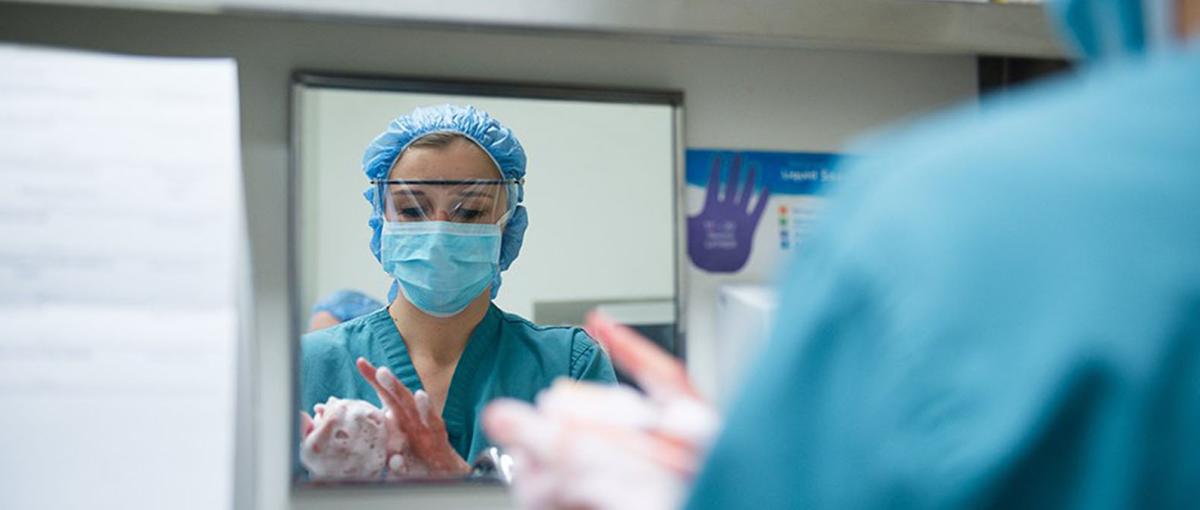Impact of COVID-19 on workplace culture
New research project investigates how an organization’s culture responds to the challenge of the COVID-19 pandemic

April 15, 2021
By Karen Cho, Senior Communications Advisor, Covenant Health
Covenant Health and the University of Alberta are partners in a first-of-its-kind research project studying how COVID-19 is shaping workplace culture.
The impetus for the project arose from concerns about the circumstances staff have faced due to the pandemic, including challenges such as redeployment, stigma surrounding workplace outbreaks, visitation protocols or changing personal protective equipment (PPE) practices.
“We talk about how Covenant Health is different and how the founding Catholic Sisters shaped our mission-inspired culture,” says Kerry McKinstry, manager of organizational development and Covenant’s co-lead on the project.
“With COVID-19, everything around us changed so quickly.
“How can we stay true to our mission when there is so much uncertainty and layers of stress, paired with the need to make quick decisions?
“What’s the best way forward? That’s what we are trying to learn from this research,” she adds.
Primary investigator Dr. Susan Sommerfeldt, an associate professor with the Faculty of Nursing at the University of Alberta, is responsible for overseeing the project activities, including interviewing participants. She says the research will develop and construct new knowledge about workplace response in a pandemic.
“We’d like to learn more about how people met the changes required of them with the arrival of COVID-19, such as being redeployed to another area or taking on new roles and responsibilities. We’d also like to gain a better understanding about the worries and concerns that people faced as they reconciled working with a contagious virus with the worry of taking it home with them at the end of their shift. We’ve had hints of this but don’t have it documented,” says Susan.
For participants who are willing to share how the pandemic has shaped their experiences at work, Susan says she is willing to listen to them all. “Study participants can be anybody who is interested and willing to share their story. We’re looking at a broad representation. We’re hoping to hear from food services, nurses, physicians, diagnostics, leadership and those in corporate services — anybody.”
Susan says both the university and Covenant Health have worked with their ethics boards to ensure that a safe environment is in place for participants to tell their stories. “We invite anyone to talk about what went well, what didn’t and what opportunities and possibilities they see.
“Having people come forward with their stories, and learning from them, acknowledges the true experiences and struggles that have happened.”
After the first interviews are completed, Susan and her team will identify unique and common elements that contribute to a broader story of what it’s like working in health care during a pandemic. A second round of interviews will follow and be filmed and edited to fit into a mini-documentary.
“Gathering research findings in this medium opens up new possibilities for knowledge distribution. The documentary, once created, is a piece of knowledge that keeps giving. Each time different audiences view it, different insights can emerge.
“The research partnership will provide quick access to lessons learned in healthcare workplaces during the pandemic. Organizations, government, donors and general public may all be interested in what we learn.”
Filming will begin in May, with a goal to complete the documentary by November. Both Susan and Kerry say they are excited to see how it will come together.
“Other research indicates that when an organization has a clear mission and purpose, employees remain dedicated and are able to continue when things get tough,” says Kerry. “As a mission-inspired organization, Covenant Health is trying to prevent mission drift during extraordinary circumstances. With an unrelenting pandemic, these are the times when we are most at risk.”